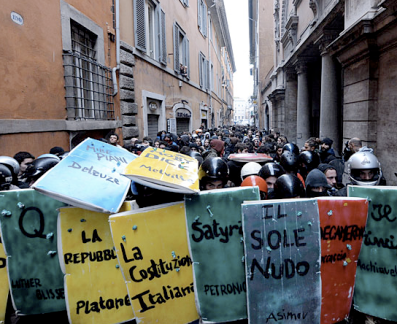Wu Ming on student protests in Italy: "Without a new story every battle is lost"

This week has seen student demonstrations and occupations across Italy as well as more in the UK. Amongst the students protesting Berlusconi's proposed education reforms, some of the most colourful took the form of the 'Book Bloc,' a group using painted shields representing works of literature against police in Rome.
Q, the first novel (written under the nom de plume Luther Blissett) by Wu Ming, the authors of Manituana, was, much to their satisfaction, on the frontline:
This afternoon, in Rome, students confronted the cops while carrying shields with book titles on them. The meaning was: it is culture itself that's resisting the cuts; books themselves are fighting the police. It was in this incendiary midst that our novel Q showed up, and in good company to boot: Moby Dick, Don Quixote, Plato's The Republic, A Thousand Plateaux ... It goes without saying that, whatever will happen, we're proud of what our novel is doing in the streets. Omnia sunt communia!

Visit the Wu Ming Foundation blog to read the post in full.
Wu Ming offer a reading of the literary shields in an interview with il Fatto Quotidiano:
It could be interesting to look closely at the classics the students chose to put on their shields. Let's look at the frontline:
Boccaccio's Decameron, which is about people sharing stories while waiting for the plague to end; Asimov's The Naked Sun, which is the description of a world where humans no longer touch each other; Melville's Moby Dick, which is an epic tale of obsession; Cervantes' Don Quixote ie the story of a proud, noble man led astray by an obsolete ideology (the chivalrous one); Petronius' Satyricon—that is, the description of a greedy, decadent power; Henry Miller's Tropic of Cancer—that is, a piece of 'auto-fiction', a scandalous mix of autobiography and fiction; Lenin's What Is To Be Done?, which deals with the problem of organization; Deleuze & Guattari's A Thousand Plateaux—that is, the theme of nomadism, the nomadic war machine.
Shall we summarize?
Our world is infected by the plague (Decameron); the plague is the atomization of social relationships (The Naked Sun). Those who refuse this state of things are often prey to an obsession that cripples their initiatives (Moby Dick), that is to say: the obsession with 'Him,' Silvio the Malignant Whale, this 'berluscocentrism' affecting the public discourse; this obsession becomes an ideological barrier and causes us to attack windmills that are put in front of us as baits (Don Quixote).
The risk is to be mesmerized by the scene of an outraged, sex-addicted, ever-carousing power (Satyricon). We will avoid such risk only if we find a new story, a narrative of ourselves that will break into this world as a real scandal (Tropic of Cancer), as opposed to all the fake scandals we see in the media. The emergence of a new, unified, conflict-bearing subjectivity would be the only truly intolerable scandal. "For it must needs be that scandals come," says the old maxim [Matthew, 18,7].
Hence the problem of organization (What Is To Be Done?) And, perhaps, the need to re-read Lenin: rejecting what is to be rejected, revamping what can be revamped. Of course, today the process of organization can no longer aim at building the party of the proletariat as in the 20th century: organization must take into account the enemy's superior mobility, it must make us able to fight in an ever-changing situation, a scenario of constant deterritorialization (A Thousand Plateaux).
However, without a narrative, without stories to be told in the night around the campfire, any guerrilla warfare in the desert is doomed to failure. And so we return to the first book, the Decameron: it is thanks to the stories we tell one another that we can prevent the spreading of the plague ...
Well, Q is the only book in the 'Book Bloc' whose authors are still living. Should they have chosen only dead writers? We might say that Q represents the 'here and now' of the struggle: the need to act now.
Visit il Fatto Quotidiano to read the interview in full.

Wu Ming, writing for the London Review of Books blog, elaborate on their perception of "Silvio the Malignant Whale," the importance of a narrative and the likely future political climate in Italy: "Berlusconism without Berlusconi"—a continuation of Berlusconism as a "fetishistic mass cult, an ideological current in Italian life and a certain way of using the media." In the comments, Wu Ming provide some etymological background to the premier—"Berlusconi's surname derives from Latin 'bis luscus,' which means 'two times cross-eyed'"—and also clarify that:
'Berlusconism without Berlusconi' means that Berlusconism is something bigger (and more complex) than Berlusconi. It is much more than simply having Berlusconi as prime minister ... Berlusconi is certainly not a cause of the current situation: he's a consequence. He was created by cultural, social and political devices that pre-existed him ...
In order to find real politics in Italy, we must look to what happens out of politics strict sense. Right now there are, from Aosta to Palermo, from Trieste to Gallipoli, hundreds of committees, associations, collectives, circles, networks that are mobilized on objectives that may look 'particular' at first sight but are actually as strategically important as a struggle can get, they bear an universal value: defence of public education, public water supplies, immigrants' rights (against the consequences of the Bossi-Fini Act), the dignity of workers, the environment, cultural institutions that resist financial cuts and downsizing, and they aren't only struggles against something, but also for something: educational issues, redevelopment of urban wastelands or degraded, 'biopolitics', lifestyle choices.
All these energies, all this passion, suffer the absence of a narrative frame that unites rather than separating.
Visit the London Review of Books blog to read the post in full. For an in-depth analysis of Berlusconi's trajectory, try Paul Ginsborg's Silvio Berlusconi: Television, Power and Patrimony.